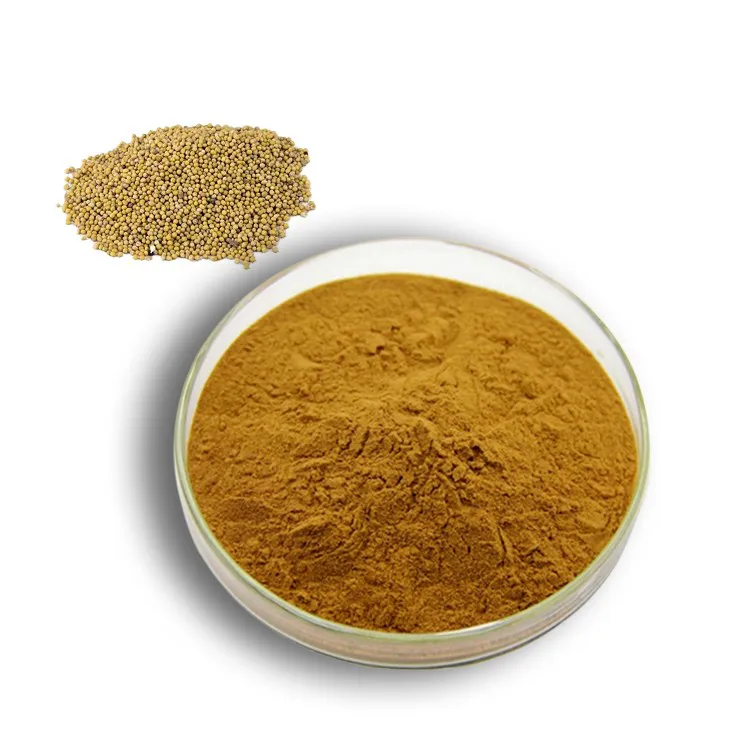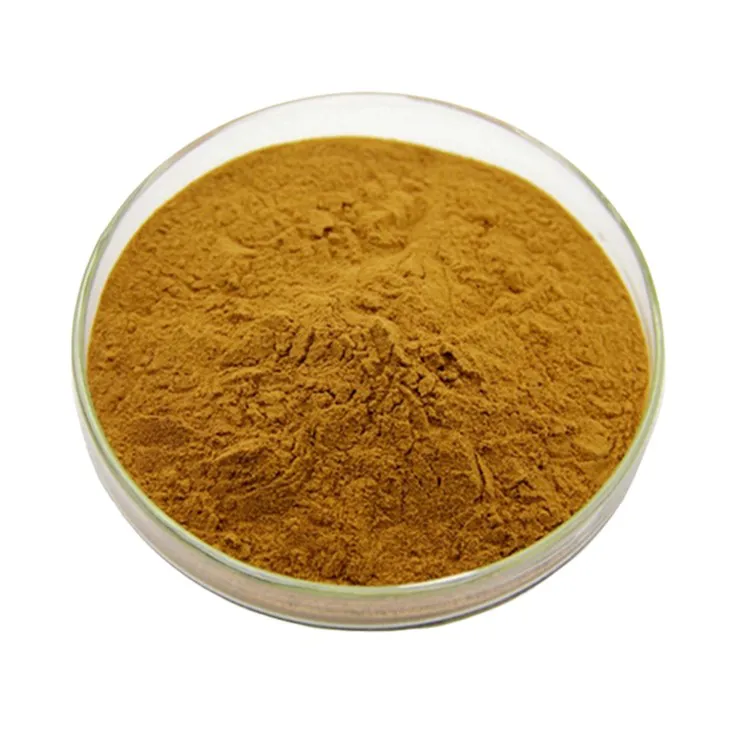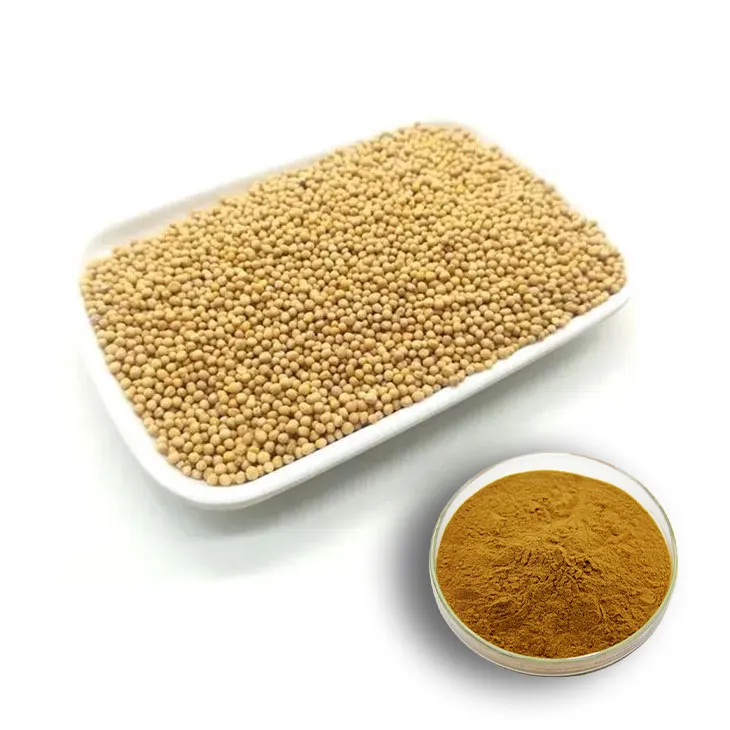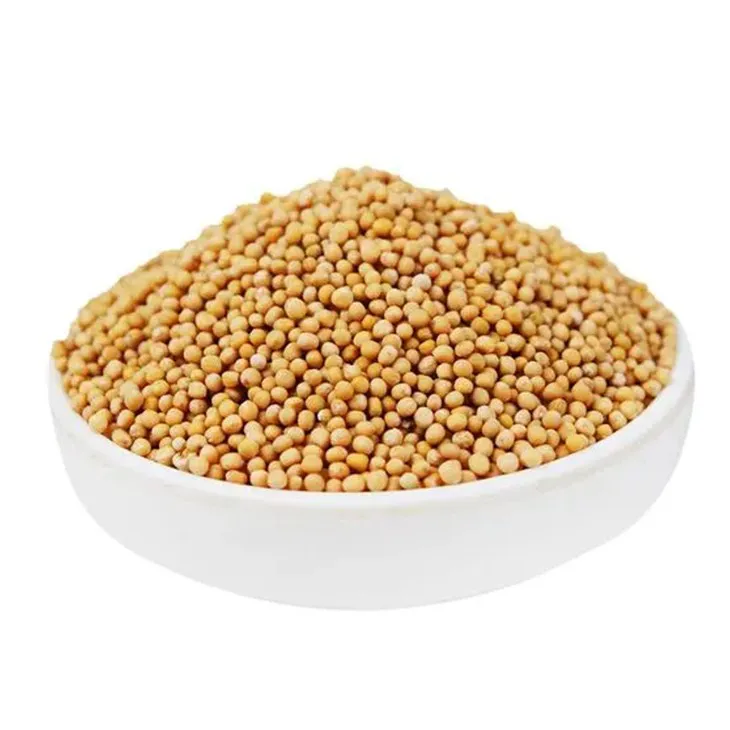- 0086-571-85302990
- sales@greenskybio.com
White mustard seed extract in Trinidad and Tobago.
2024-12-10

1. Introduction to Trinidad and Tobago's White Mustard
Trinidad and Tobago, a nation renowned for its bountiful natural resources, is home to white mustard, scientifically named Sinapis alba. The white mustard extract sourced from this region has been garnering significant attention in recent times. This extract is not only unique but also holds great potential in various fields.

2. Chemical Composition of the White Mustard Extract
The white mustard extract from Trinidad and Tobago contains a diverse range of bioactive compounds. One of the most notable components is glucosinolates.
2.1 Glucosinolates and Their Significance
Glucosinolates are compounds that have been the subject of extensive research due to their potential health - promoting effects. These compounds are unique to plants of the Brassicaceae family, to which white mustard belongs.
For instance, glucosinolates are known to possess antioxidant properties. Antioxidants play a crucial role in the human body by counteracting free radicals. Free radicals are unstable molecules that can cause damage to cells, proteins, and DNA. By neutralizing these free radicals, the antioxidants in white mustard extract can help in reducing oxidative stress. Oxidative stress has been linked to a variety of health problems, including chronic diseases such as heart disease, cancer, and neurodegenerative disorders.

3. Use in Traditional Medicine
The use of white mustard extract in traditional medicine in Trinidad and Tobago has a long - standing history that spans centuries.
3.1 Topical Application for Pain and Inflammation Relief
One of the primary applications of white mustard extract in traditional medicine is its topical use for pain and inflammation relief. When applied to the skin, the extract has an irritating and warming effect. This effect, rather than being harmful, is believed to be beneficial in several ways.
It is thought that this irritation and warmth can stimulate blood circulation in the affected area. Improved blood circulation can bring more oxygen and nutrients to the site of injury or inflammation, which in turn can promote the healing process. For example, in cases of minor muscle strains or joint pain, the application of white mustard extract may help to reduce swelling and discomfort.

4. Culinary Applications
In the culinary world, the white mustard extract from Trinidad and Tobago is highly valued for its unique flavor profile.
4.1 Adding Tang to Dishes
The extract imparts a special tang to a wide variety of dishes. This tangy flavor can enhance the overall taste of the food, making it more appealing to the palate.
4.2 Use in Salad Dressings
One of the common uses of white mustard extract is in salad dressings. It can be combined with other ingredients such as oil, vinegar, and herbs to create a delicious and tangy dressing. The extract not only adds flavor but also provides a bit of a spicy kick, which can complement the fresh vegetables in a salad.
4.3 Marinades and Sauces
White mustard extract is also a great addition to marinades and sauces. When used in marinades, it can help to tenderize meat and add a depth of flavor. In sauces, it can enhance the complexity of the taste, whether it is a creamy sauce or a tangy barbecue sauce.

5. Cultivation and Extraction of White Mustard in Trinidad and Tobago
The cultivation of white mustard in Trinidad and Tobago is an important aspect of the availability of its extract.
5.1 Ideal Growing Conditions
White mustard thrives in certain environmental conditions in Trinidad and Tobago. It prefers well - drained soil and a relatively warm climate. The country's geographical location and climate provide suitable conditions for the growth of white mustard plants.
5.2 Extraction Methods
There are several methods for extracting the valuable compounds from white mustard seeds. One common method involves the use of solvents. The seeds are first ground into a fine powder, and then a suitable solvent, such as ethanol, is used to extract the bioactive compounds. Another method is mechanical extraction, which can be used to obtain the oil - rich fraction of the extract.
6. Research and Development
Continuous research and development efforts are being made to further understand and utilize the white mustard extract from Trinidad and Tobago.
6.1 Scientific Studies
Scientists are conducting various scientific studies on the white mustard extract. These studies aim to explore its full range of health benefits, as well as to optimize the extraction methods to obtain the highest quality and quantity of bioactive compounds.
For example, research is being carried out to investigate the potential of white mustard extract in treating specific diseases. Some studies are focusing on its anti - inflammatory properties and its role in modulating the immune system.
6.2 Product Development
Based on the research findings, there is also an increasing trend in product development. Companies are starting to develop dietary supplements, topical creams, and food products that contain white mustard extract.
These products are designed to target different consumer needs, such as those seeking natural health remedies or those looking for unique and flavorful food ingredients.
7. Market Potential
The white mustard extract from Trinidad and Tobago has significant market potential both domestically and internationally.
7.1 Domestic Market
In Trinidad and Tobago, there is a growing awareness among consumers about the health benefits and culinary uses of white mustard extract. As a result, there is an increasing demand for products containing this extract in the domestic market. Local food manufacturers and health - product companies are starting to capitalize on this trend by introducing new products.
7.2 International Market
On the international front, the unique properties of white mustard extract make it an attractive ingredient in the global health and food markets. There is a growing interest in natural and plant - based products, and white mustard extract fits well into this trend.
Countries with a high demand for natural health supplements and exotic food ingredients are potential markets for Trinidad and Tobago's white mustard extract. However, there are also challenges in entering the international market, such as meeting regulatory requirements and competing with other similar products.
8. Sustainability and Conservation
As the demand for white mustard extract grows, it is important to ensure the sustainability and conservation of white mustard resources in Trinidad and Tobago.
8.1 Sustainable Cultivation Practices
Farmers in Trinidad and Tobago are encouraged to adopt sustainable cultivation practices. This includes proper soil management, water conservation, and the use of organic fertilizers and pesticides. Sustainable cultivation not only ensures the long - term availability of white mustard but also helps to protect the environment.
8.2 Conservation Efforts
There are also conservation efforts in place to protect the natural habitats of white mustard. This is important as white mustard is a native plant species in Trinidad and Tobago, and its conservation is crucial for maintaining the biodiversity of the region.
9. Conclusion
In conclusion, the white mustard extract from Trinidad and Tobago is a valuable natural resource with a wide range of applications. From its potential health benefits due to its unique chemical composition to its traditional medicinal uses and culinary applications, it has much to offer.
With ongoing research and development, as well as efforts in sustainability and conservation, the future of white mustard extract in Trinidad and Tobago looks promising. It has the potential to make a significant impact in the health, food, and economic sectors, both locally and globally.
FAQ:
What are the main bioactive compounds in White mustard seed extract from Trinidad and Tobago?
The main bioactive compounds in White mustard seed extract from Trinidad and Tobago are glucosinolates. These compounds are known for their potential health - promoting effects.
How does White mustard seed extract from Trinidad and Tobago help in traditional medicine?
In traditional medicine, white mustard seed extract from Trinidad and Tobago has been used for centuries. It has been applied topically to relieve pain and inflammation, perhaps due to its irritating and warming effects on the skin. This could stimulate blood circulation in the affected area, promoting the healing process.
What is the role of white mustard seed extract in the culinary world?
In the culinary world, the unique flavor of white mustard seed extract can add a special tang to various dishes. It can be used in salad dressings, marinades, and sauces, enhancing the taste profile of the food.
Why is white mustard native to Trinidad and Tobago?
The text doesn't provide specific reasons why white mustard is native to Trinidad and Tobago. However, it is a fact that it is native to this region.
What are the antioxidant properties of white mustard seed extract?
The glucosinolates in white mustard seed extract may have antioxidant properties. These can help in fighting against free radicals in the body and reducing oxidative stress.
Related literature
- Title: The Bioactive Compounds of White Mustard in Trinidad and Tobago"
- Title: "Traditional Uses of White Mustard Extract in Trinidad and Tobago"
- Title: "White Mustard Extract: Its Culinary Significance in Trinidad and Tobago"
- ▶ Hesperidin
- ▶ citrus bioflavonoids
- ▶ plant extract
- ▶ lycopene
- ▶ Diosmin
- ▶ Grape seed extract
- ▶ Sea buckthorn Juice Powder
- ▶ Beetroot powder
- ▶ Hops Extract
- ▶ Artichoke Extract
- ▶ Reishi mushroom extract
- ▶ Astaxanthin
- ▶ Green Tea Extract
- ▶ Curcumin Extract
- ▶ Horse Chestnut Extract
- ▶ Other Problems
- ▶ Boswellia Serrata Extract
- ▶ Resveratrol Extract
- ▶ Marigold Extract
- ▶ Grape Leaf Extract
- ▶ blog3
- ▶ blog4
- ▶ blog5
-
Pure 85% Tomentil Extract.
2024-12-10
-
Rose Hip Extract
2024-12-10
-
Hops Extract
2024-12-10
-
Saponin Extract
2024-12-10
-
Peppermint Oil
2024-12-10
-
Tormentil Extract
2024-12-10
-
Citrus Aurantium Extract
2024-12-10
-
Lemon Extract
2024-12-10
-
Natural grape seed extract
2024-12-10
-
Coconut Water Powder
2024-12-10
-
Dandelion Root Extract
2024-12-10





















